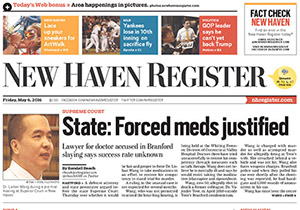


She’s had to navigate enrolling children, who in some cases speak indigenous languages, in virtual schooling from homes where they often don’t have access to laptops or reliable Internet. The pandemic has also made Mendieta’s work more difficult. “The sponsors are choosing between bills and basic needs and legal assistance as well,” Mendieta said, adding that many of the sponsors don’t qualify for any of the COVID relief available. The coronavirus pandemic has made it even more difficult for sponsors, who are financially responsible for the minors including finding legal representation for them, to make ends meet. Given they are undocumented, they don’t qualify for health insurance, so any therapy sessions have to be paid for out of pocket. One of the biggest struggles is connecting them with mental health services. “A lot of these children have history of trauma ranging from anxiety, PTSD (post-traumatic stress disorder) to a history of sexual and physical abuse,” Mendieta said.

Cases flagged because there’s a concern with the sponsor will also be monitored for a longer period of time. Minors who are identified as victims of abuse or trafficking, or who have a medical condition or disability will be monitored until their 18th birthday or until they receive immigration status or an order of deportation, Mendieta said. We worry a lot about these other children who get released and get no one to help them out,” Cruz said. “Ninety days is not enough time but at least they get that initial 90 days. She ensures the sponsor enrolls the minor in school, is aware of upcoming immigration court dates, and connects them with legal aid and community resources. Once a minor is released to a sponsor, Mendieta handles the case for up to 90 days. But due to the pandemic, many of her assessments have been done virtually. She makes sure the sponsor and child actually know each other or whether the sponsor has a connection to the child’s family back in their home country, and if the sponsor has sponsored other children, that he or she has followed through with caring for those children.īefore the coronavirus pandemic, Mendieta was regularly going into sponsors’ homes to ensure they were suitable environments for the children. Izarelli Mendieta, a case manager with Project Rescue, interviews the minors while they are in the shelters, as well as their identified sponsors and any other household members living with the sponsor. That’s on top of limited opportunities for schooling and finding work, Cruz said. Some of the children have witnessed family members being killed or are forced to join gangs if they stay in their home countries. “These children are fleeing for specific reasons,” said Leonela Cruz, director of CIRI’s Project Rescue, which provides programming for unaccompanied minors. The organization doesn’t see every migrant child that comes into Connecticut, usually handling about 75 cases a year through a contract with the federal government. Once a sponsor is identified for these children, that’s when organizations like the Bridgeport-based Connecticut Institute for Refugees and Immigrants step in. While the children are in the shelters, case managers work to vet sponsors, in some cases family members, or other people they know who are already living in the U.S. This story appeared in New Haven Register, Julia Bergman, April 19, 2021.


 0 kommentar(er)
0 kommentar(er)
